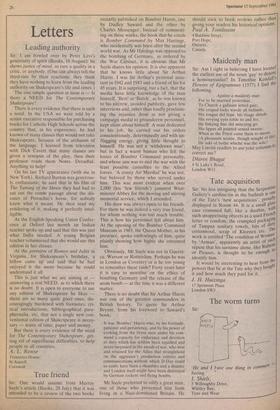True friend
Sir: One would assume from Murray Sayle's article (Books, 28 July) that it was intended to be a review of the two hooks recently published on Bomber Harris, one by Dudley Saward and the other by Charles Messenger. Instead of comment- ing on these works, the book that he extols is Bomber Command by Max Hastings, who incidentally was born after the second world war. As Mr Hastings was opposed to the bombing of Germany, as ordered by the War Cabinet, it is obvious that Mr Sayle shares his opinion. It is also apparent that he knows little about Sir Arthur Harris. I was Sir Arthur's personal assis- tant in 1942 and 1943 and a friend of his for 45 years. It is surprising, but a fact, that the media have little knowledge of the man himself. 'Bert' or 'Butch', as he was known to his aircrew, avoided publicity, gave few interviews and, other than loudly proclaim- ing the injustice done in not giving a campaign medal to groundcrew personnel, kept silent about himself. A man dedicated to his job, he carried out his orders conscientiously, determinedly and with un- flagging energy, giving little thought to himself. He was not a 'withdrawn man'; but in fact a warm human who felt the losses of Bomber Command personally, and whose aim was to end the war with the least possible casualties to the Allied forces. `A crusty Air Marshal' he was not, but beloved by those who served under him. This was most evident when over 2,000 (his 'few friends') jammed West- minster Abbey for the moving and stirring memorial service, which I attended.
His door was always open to his friends. For them he was indeed a very true friend, for whom nothing was too much trouble. This is how his personnel felt about him. At the opening of the Bomber Command Museum in 1983, the Queen Mother, in his presence, spoke endearingly of him, quite plainly showing how highly she esteemed him.
Obviously, Mr Sayle was not in Guerni- ca, Warsaw or Rotterdam. Perhaps he was in London or Coventry or is he too young to remember these raids? Forty years later it is easy to moralise on the ethics of bombing Germany and the release of the atom bomb — at the time it was a different matter.
There is no doubt that Sir Arthur Harris was one of the greatest commanders in British history. To quote Sir Arthur Bryant. from his foreword to Saward's hook:
It was 'Bomber' Harris who, by his fortitude. patience and persistence, and by his power of evoking from the brave men under his com- mand a capacity for endurance and devotion to duty which has seldom been equalled and never surpassed in the annals of war, who won and retained for the Allies that stranglehold on the aggressor's production centres and communications without which D-Day could so easily have been a shambles and a disaster and London itself might have been destroyed by German rockets and flying bombs.
Mr Sayle preferred to vilify a great man, one of those who prevented him from living in a Nazi-dominated Britain. He should stick to book reviews rather than giving your readers his historical opinions.
Paul A. Tomlinson
4 Baldwin Street, Port Hope, Ontario, Canada


















































 Previous page
Previous page